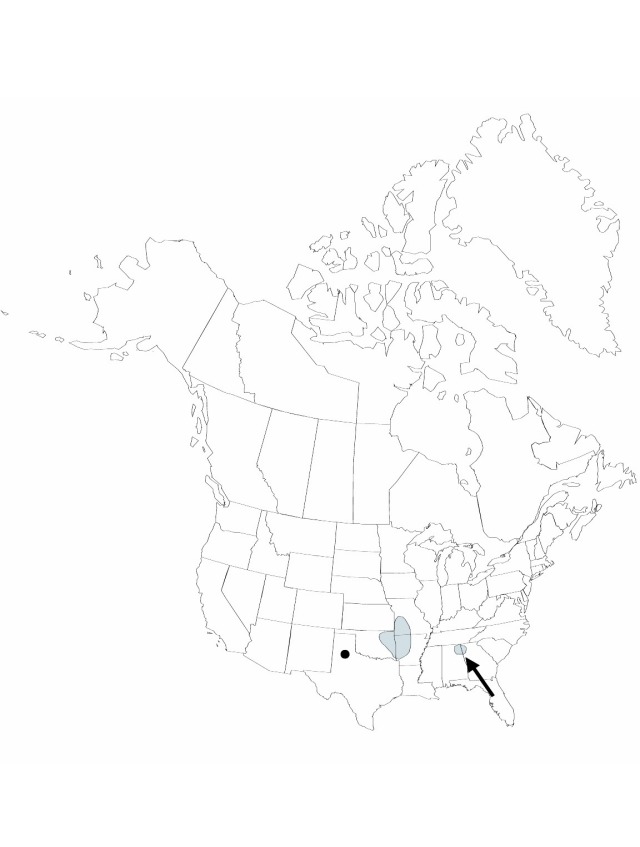Difference between revisions of "Tradescantia ernestiana"
Contr. Arnold Arbor. 9: 58, plate 8, map 4. 1935.
FNA>Volume Importer |
imported>Volume Importer |
||
| (6 intermediate revisions by 2 users not shown) | |||
| Line 6: | Line 6: | ||
|place=9: 58, plate 8, map 4. 1935 | |place=9: 58, plate 8, map 4. 1935 | ||
|year=1935 | |year=1935 | ||
| + | }} | ||
| + | |special_status={{Treatment/ID/Special_status | ||
| + | |code=E | ||
| + | |label=Endemic | ||
}} | }} | ||
|basionyms= | |basionyms= | ||
| Line 22: | Line 26: | ||
|habitat=Wooded hillsides, ledges and bluffs, occasionally along streams or in pastures | |habitat=Wooded hillsides, ledges and bluffs, occasionally along streams or in pastures | ||
|distribution=Ala.;Ark.;Ga.;Mo.;Okla.;Tex. | |distribution=Ala.;Ark.;Ga.;Mo.;Okla.;Tex. | ||
| − | |discussion=<p>Tradescantia ernestiana is sympatric with, and easily confused with, T. virginiana in northern Alabama and perhaps northern Georgia [reported from Georgia by C. Sinclair (1967, p. 87), but no specimens are cited and I have seen none]. At present, the two species can be separated only by the relative width of the blade and sheath of the distal leaves. They are obviously closely related and should be studied in the field in the southern Appalachians where their ranges overlap. The Texas record is taken from C. Sinclair (1967).</p><!-- | + | |discussion=<p><i>Tradescantia ernestiana</i> is sympatric with, and easily confused with, <i>T. virginiana</i> in northern Alabama and perhaps northern Georgia [reported from Georgia by C. Sinclair (1967, p. 87), but no specimens are cited and I have seen none]. At present, the two species can be separated only by the relative width of the blade and sheath of the distal leaves. They are obviously closely related and should be studied in the field in the southern Appalachians where their ranges overlap. The Texas record is taken from C. Sinclair (1967).</p><!-- |
| − | --><p>The hybrid Tradescantia ernestinana × T. ozarkana is known from Arkansas and Missouri.</p> | + | --><p>The hybrid <i>Tradescantia</i> ernestinana × <i>T. ozarkana</i> is known from Arkansas and Missouri.</p> |
|tables= | |tables= | ||
|references= | |references= | ||
| Line 32: | Line 36: | ||
-->{{#Taxon: | -->{{#Taxon: | ||
name=Tradescantia ernestiana | name=Tradescantia ernestiana | ||
| − | |||
|authority=E. S. Anderson & Woodson | |authority=E. S. Anderson & Woodson | ||
|rank=species | |rank=species | ||
| Line 45: | Line 48: | ||
|publication title=Contr. Arnold Arbor. | |publication title=Contr. Arnold Arbor. | ||
|publication year=1935 | |publication year=1935 | ||
| − | |special status= | + | |special status=Endemic |
| − | |source xml=https:// | + | |source xml=https://bitbucket.org/aafc-mbb/fna-data-curation/src/2e0870ddd59836b60bcf96646a41e87ea5a5943a/coarse_grained_fna_xml/V22/V22_548.xml |
|genus=Tradescantia | |genus=Tradescantia | ||
|species=Tradescantia ernestiana | |species=Tradescantia ernestiana | ||
Latest revision as of 20:32, 5 November 2020
Herbs, erect or ascending, rarely rooting at nodes. Roots (1–)1.5–5 mm thick, fleshy. Stems not flexuous, 5–40 cm; internodes usually glabrous. Leaves spirally arranged, sessile; blade dull green, linear-lanceolate to lanceolate-oblong, 9–27 × 1–4 cm (distal leaf blades wider than sheaths when sheaths opened, flattened), base cuneate to rounded, apex acuminate, not glaucous, glabrous or sparsely puberulent. Inflorescences terminal; bracts foliaceous. Flowers distinctly pedicillate; pedicels 2–3.2 cm, minutely pilose; sepals somewhat inflated, 9–16 mm, uniformly eglandular-pilose; petals distinct, deep blue, purple, or rose-red, broadly ovate, not clawed, 1.2–1.5 cm; stamens free; filaments bearded. Capsules 5–7 mm. Seeds 2–3 mm. 2n = 12.
Phenology: Flowering spring (Mar–May).
Habitat: Wooded hillsides, ledges and bluffs, occasionally along streams or in pastures
Distribution

Ala., Ark., Ga., Mo., Okla., Tex.
Discussion
Tradescantia ernestiana is sympatric with, and easily confused with, T. virginiana in northern Alabama and perhaps northern Georgia [reported from Georgia by C. Sinclair (1967, p. 87), but no specimens are cited and I have seen none]. At present, the two species can be separated only by the relative width of the blade and sheath of the distal leaves. They are obviously closely related and should be studied in the field in the southern Appalachians where their ranges overlap. The Texas record is taken from C. Sinclair (1967).
The hybrid Tradescantia ernestinana × T. ozarkana is known from Arkansas and Missouri.
Selected References
None.